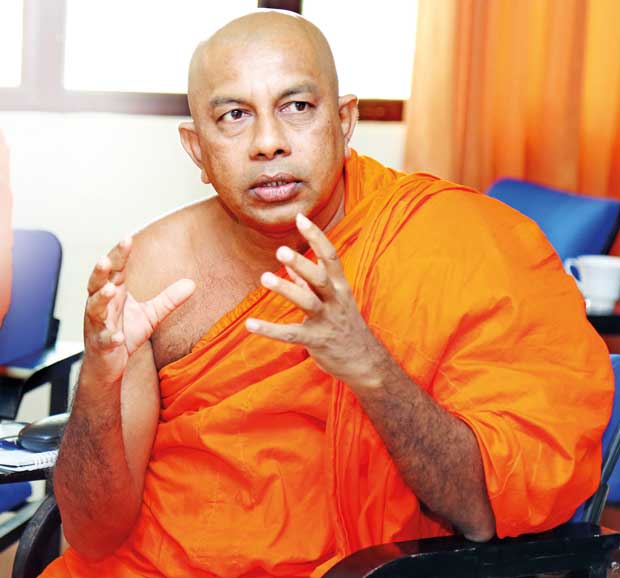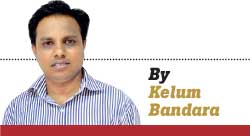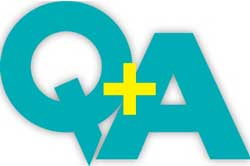14 Jul 2017 - {{hitsCtrl.values.hits}}

Ven. Prof. Induragare Dhammarathana Thera, who is involved in the activities of the nationalist groups, supports the statement made by the Mahanayake Theras that the country did not require a new Constitution at this hour. Ven. Dhammarathana Thera, attached to the Department of Sanskrit at Kelaniya University, says the Mahanayake Theras fulfilled their historic duties. Following are the excerpts of the interview with him:
Q :- In some quarters close to the government, there is criticism of the statements made by the Mahanayake Theras of the three chapters ruling out a new constitution at this hour. What is your view?
The Mahanayake Thera said in clear cut terms that a new Constitution or proposals for it were not the need of the hour. They justifiably articulated that this was not the time for it. There are no factors that call for a new Constitution either in terms of contextual terms or ideological terms. They only pointed out the need to prioritize the finding of solutions to basic issues confronting the country rather than inviting trouble by meddling with unnecessary affairs. The Mahanayake Theras, as the lay guardians of nation, made the appropriate statement taking into full account the current developments. We perceive it as the legitimate and responsible duty of the leaders of Maha Sangha. It is a historic statement.
Q :- Yet, the government ministers hold the position there is a mandate from 6.2million people for a new constitution, and that they should act accordingly. They indicate in this manner that the Mahanayake Theras have no right to rule it out. How do you respond?
The government does not seem to be listening to the Mahanayake Theras on this matter
First, in the run up to the elections, the present rulers laid emphasis only on the pledges for the  introduction of new electoral reforms and the abolition of executive presidency.
introduction of new electoral reforms and the abolition of executive presidency.
There was no talk about a new Constitution as such. Therefore, they cannot justify their present attempt for a new constitution citing the mandate from 6.2 million people.
Prior to the elections, the government only talked about bringing fraudsters to book, working out new electoral reforms and abolishing executive presidency. They never talked about the nature of the constitution being worked out at the moment. The Mahanayake Theras asked the government not to undertake anything that was not promised to the country.
It is malicious to say that the Mahanayake Theras have no right to speak on such matters. It is extremely malicious. The Mahanayake Thera used to advise the successive governments. It is the historic role historically assigned or meant for them. If it is not so, why do all those concerned call on the Mahanayake Theras and consult them? The Mahanayake Theras have played the role historically and traditionally bestowed upon them.
Q : You mentioned that the Mahanayake Theras stressed there was no need for a new Constitution. Does it mean that there is a need for it in the future?
A new constitution is needed only after a broad public consultation process. The Lal Wijenayake report has been worked out by this government without consulting a wider cross section of society. It has been prepared by seeking the views of the NGOs, those living in the north and the east and some  non-Sinhalese living abroad. We do not see wide public participation in the process. The Mahanayake Theras imply that if a new Constitution is needed, it should be done with broad consultation of the general public, political organizations and other civil society organizations. It is a time-consuming exercise. No constitution should contain provisions leading to the partition of the country.
non-Sinhalese living abroad. We do not see wide public participation in the process. The Mahanayake Theras imply that if a new Constitution is needed, it should be done with broad consultation of the general public, political organizations and other civil society organizations. It is a time-consuming exercise. No constitution should contain provisions leading to the partition of the country.
Tradition of Sri Lanka’s Buddhist monks is unique compared with the clergies of other countries
When you say partition of the country, it has a hollow cliché today. In this instance, we have to determine whether we should delegate power or resources. Responsibilities have to be delegated. In the case of people’s rule, power has to be centralized. Yet, resources and responsibilities have to be delegated to lower levels. We look to such a country.
Q : The government also says there is no final draft containing constitutional proposals, and as such the Mahanayake Theras have been misled by someone to make this statement. What are your views?
If we have not seen a skunk or heard about one, we should not have made any preconceived idea about the strong unpleasant smell it emits. We have heard about this animal. So, we know it stinks where the skunk moves, as goes the saying. We knew the nature of LTTE Leader Velupillai Prabhakaran. We could be certain in our conclusion that would not have observed sil or made Buddhist religious observances at any cost.
First, in the run up to the elections, the present rulers laid emphasis only on the pledges for the introduction of new electoral reforms and the abolition of executive presidency
It is crystal clear for us that the government is up to something unpleasant for us. We have a clear conclusion about the position to be taken by the government on SAITM.
In this constitution-making process, there were numerous reports presented. We also got hold of them. I had a look at the reports of the six subcommittees. The main report will be made based on recommendations by these subcommittees. Then, how can the government deny the existence of a move for a new Constitution of this nature? How can the government deny that recommendations in the reports will not be incorporated into the final draft?
We have to stand up at this point only .
Q : How do you look at the historical role played by Maha Sangha in guiding the rulers?
Tradition of Sri Lanka’s Buddhist monks is unique compared with the clergies of other countries. When we are ordained as Buddhist monks, we do away with our names given by our beloved parents. Instead, we adopt Pali names mentioned in Thripitaka. We become followers of the Buddha even by name in that sense. We cast aside our surnames to be replaced with names of villages of this country.
That may even be a name given to a village which is sometimes confined to a few perches of land. Then, Sri Lankan Buddhist monks get attached to their country and religion even by their names. Our main purpose, in that sense, is not only to attain the supreme bliss of Nirvana but also to fulfil a historic obligation cast upon us. Mainly, the Sinhalese males become Buddhist monks. The doctrine, or Dhamma preached by the Buddha, is fostered in this land.
The Republic of Kalmykia is the only Buddhist state in Europe. Its national flag also bears the lotus flower. In Thailand, 97 percent of the population is Buddhist. None of these countries has committed in its constitution to protect Buddha Sasana. The Buddha preached for the good of all, not solely for people of Sri Lanka. We, as Buddhists, do not wish good only for the Sinhalese. We wish so for all living beings. We seek blessings for the whole world. Then, only Sri Lanka has committed to protect this doctrine meant for the benefit of all. Buddhist monks stand for the protection of Buddha Dhamma delivered 2561 years ago. They are responsible and accountable for it.
Nowhere in Buddhist texts and Pali canons, do we find any reference advocating the alienation of other people along with their beliefs.
Then, communalism cannot be condoned according to Buddhist teachings. Bhikkhus are meant for fostering and nurturing Buddha Dhamma which is espousing great compassion to all. The rulers are at the helm of affairs. So, Bhikkhus advise them.
The government does not seem to be listening to the Mahanayake Theras on this matter. However, if the Joint Opposition claims to be acting in the public interest, it should not become party to the constitution making process now.
Q : Buddhism is a religion advocating compassion and well-being for all the communities as you said. But, there is the allegation that the nationalist groups try to suppress the rights of minority communities by giving foremost rights to Buddhists. Actually Tamil National Alliance (TNA) MP M.A. Sumanthiran mentioned it. What is your view?
I do not know on what basis they define the concept called ‘minorities’. If you look at the Colombo city limits, who will be the minority. The Sinhalese are the minority in this instance. In the Jaffna peninsula, the Sinhalese are again the minority. In the East, it is the same. Does Mr. Sumanthiran talk about this minority group? What does he say about the Sinhalese living in the north and the east as minorities?
He is appearing for the minority Tamils. Otherwise, he is not for the minorities of the country. The Northern Provincial Council does not permit the construction of places of Buddhist worship. That Council does not use Sinhala as a language in its communication activities. It does not care about the Sinhalese living there in taking decisions.
In that context, the Northern and Eastern Provincial Councils are racially biased.
In Sri Lanka, the Sinhalese have not denied the Tamils or Muslims of their fundamental rights.
29 Oct 2024 29 Oct 2024
29 Oct 2024 29 Oct 2024
29 Oct 2024 29 Oct 2024
29 Oct 2024 29 Oct 2024
29 Oct 2024 29 Oct 2024